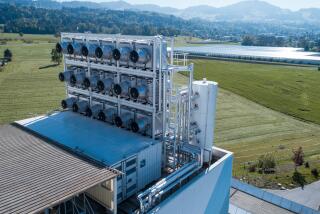Superconductor Contract in Works for Space Systems
- Share via
SAN DIEGO — General Dynamics’ San Diego-based Space Systems Division and Westinghouse Electric are in exclusive negotiations for a $200-million contract to manufacture more than 500 massive, high-tech magnets for the Superconducting Super Collider particle accelerator, the companies said Tuesday.
Subsequent awards could increase the contract’s value to about $1 billion, General Dynamics spokesman Jack Isabel said Tuesday. The SSC hopes to conclude negotiations on the initial, $200-million contract by February, SSC spokesman Russ Wylie said Tuesday.
Acting as a team, the companies beat out a half dozen other competitors for the right to negotiate a final contract. The value of General Dynamics’ share of the contract will be determined in the negotiations.
Scientists have described the SSC, which is being constructed by the U.S. Department of Energy 30 miles south of Dallas, as the largest scientific instrument ever designed. The accelerator, a circle measuring more than 50 miles, will propel minute particles at the speed of light, giving scientists a rare opportunity to study fundamental principals of energy and matter.
The magnets, each 12.5 tons and 52 feet long, are an “essential part” of the massive SC, Wylie said.
The government contract represents “a significant order for the Space Systems Division, given global events and belt-tightening” in the defense contracting industry, Isabel said. General Dynamics expects to add 40 employees at a Hammond, La., manufacturing plant, but the contract would not create new jobs in San Diego, where as many as 160 existing employees would design the massive magnets, Isabel said.
If the contract is completed, engineers at General Dynamics and the SSC would initially design and test 15 prototype magnets. General Dynamics and Westinghouse, based in Pittsburg, Pa., would then build 502 more magnets. Later, the two companies would compete for parts of the $1-billion contract to build nearly 8,000 more magnets, Isabel said.
Universities Research Assn., a nonprofit consortium that includes 77 research universities in the U.S. and Canada, is designing and building the facility near Dallas for the DOE. It is scheduled to open in 1999, Wylie said.
Although General Dynamics’ Space Systems Division is best known for its Atlas rockets, the company has won several similar magnet contracts during the first 15 years, Isabel said. The Space Systems Division has captured more than half of the orders nationwide for large, superconducting magnets that are used in particle acceleration devices, Isabel said.
More to Read
Inside the business of entertainment
The Wide Shot brings you news, analysis and insights on everything from streaming wars to production — and what it all means for the future.
You may occasionally receive promotional content from the Los Angeles Times.










